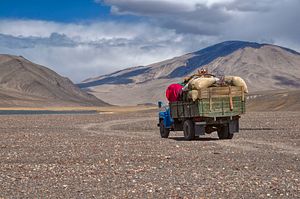Weekend reads (and listens) on Central Asia:
First, as it seems Tajikistan has neared the end of its crackdown on the Islamic Renaissance Party of Tajikistan, Nate Schenkkan’s most recent Central Asianist podcast is particularly timely. His guest is Hélène Thibault, a post-doctoral researcher at the Center for International Studies at the University of Montreal. Thibault gives a brief but detailed history of the IRPT, from inception to its marginalization over the past few years and its apprent end–its leaders are detained or in exile and it is no longer legal. It is the end of an era.
Particularly interesting is Thibault’s account of her first experience visiting Tajikistan in 2010. She spent most of her time in the northern Tajik city of Khujand where she said the IRPT has a particularly large office. The IRPT, she says, would host lectures, language classes (Arabic and English), and invite other political parties–the Communist Party, the Social Democrats and even the ruling party–to discuss all kinds of issues. She said it was “a very open environment.” But in subsequent years, people began to tell her about harassment and arrests, culminating in party members being forced to read statements denouncing the party. Listen to the whole podcast here.
Next, check out this article and photo essay at The Rice Bowl by Qi Tian in which the author discusses the socioeconomic effects of Chinese investment in Central Asia, particularly in Tajikistan. Qi takes a look at what economic trouble and security concerns in Tajikistan mean for Chinese business interests. The Chinese are invested in making the One Belt, One Road happen and Central Asia is a brick on the road. That said, Tajikistan isn’t really a strategic concern for China and when Dushanbe has trouble, despite ties to Beijing, Moscow is the first capital it calls on. “This is why, despite joining Beijing’s military parade, Tajikistan’s president turned to Moscow for help at suppressing internal rebel groups.”
Speaking of Russia in Central Asia, Eurasianet has an interesting piece on Dmitry Kiselyov, head of Rossiya Segodnya, who was in Bishkek recently. Rossiya Segodnya is a Russian news agency that was created in 2013 by the orders of Russian President Vladimir Putin; it incorporated RIA Novosti and produces Sputnik. In Kyrgyzstan, Kiselyov “explained how a Eurasian media system might distinguish itself from the West.” For one thing, according to Kiselyov “The difference between journalism in the post-Soviet space and the West is that we produce, we don’t reproduce.” Needless to say, Kiselyov doesn’t think much of Western media. The visit, and Kiselyov comments, come a little more than a week before Kyrgyzstan votes on a new Parliament. The election is drawing a good bit of attention, and some believe it makes Russia a touch nervous. For campaign updates from Kyrgyzstan check out updates from RFE/RL’s Bruce Pannier who is traveling around the country as the election draws near.
Now, something to watch. I wrote earlier this week on the cotton harvest in Uzbekistan, but the cotton fields are not the only place Uzbeks are forced by the state to work for little reward. According to this short documentary by the Uzbek-German Forum, Uzbekistan is the 3rd largest producer of silkworm cocoons in the world. In 2013, the Uzbek silkworm industry produced more than 26,000 tons. The Uzbek government, the documentary comments, doesn’t create incentives for production; instead thousands of farmers are obliged to tend silkworms and meet government quotas. The farmers are paid a meager advance at the beginning of the season that doesn’t meet the production costs. As with cotton, the state banks the profits of the industry.
Lastly, if academic journals are more your speed, here’s a great list of journals focused on post- Soviet spaces.

































